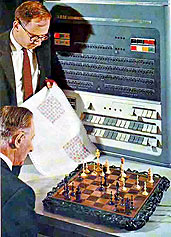 mack posted an interesting clip in the message boards. A 1972 book "Mathematics" has this amusingly antiquated photo of a chess-playing computer. This was just a passing puff-piece reference, if a revealing one. The earliest literature on chess machines is composed mostly of academic journals full of technical language and equations. Huge strides in improving the chess algorithms were made every few years, quite a contrast to today.
mack posted an interesting clip in the message boards. A 1972 book "Mathematics" has this amusingly antiquated photo of a chess-playing computer. This was just a passing puff-piece reference, if a revealing one. The earliest literature on chess machines is composed mostly of academic journals full of technical language and equations. Huge strides in improving the chess algorithms were made every few years, quite a contrast to today.
Most of the programmers you talk to today say that it's all about steady incremental improvements in the search and evaluation. When a new version is sufficiently stronger than the last - and at least on par with its peers - it is published. Rather boring stuff, really. It is eternally interesting to watch how programs with roughly the same performance level play significantly different stylistically just as humans do. It makes you wonder how much style difference between human players is personality and how much is simply different math.

Let me give you all a few scraps of information about this:
- 'Mathematics' was actually first published in 1963, and again in '65, before the 1972 revision I have.
- The photo is credited to Andreas Feininger.
- It may not be possible read it in the picture I posted up, but at the top it reads:
IBM ELECTRONIC PROCESSING MACHINE TYPE 704
- The context of the page, mostly unrelated to chess, is as follows:
Talented Machines That Act Almost Like Human Beings
Computers seem to be taking over more and more human functions. They write music, compose poetry, evaulate stock portfoliios and even play the intellectual game of chess. Experts are now trying to make them even more like people by training them to respond to the human voice. One big obstacle is that sound patterns made by people's voices are as distinctive as their fingerprints: when the computer of the future "hears" a spoken word it will have to ignore those sounds peculiar to the voice, like volume and pitch, and retain only the "pure" phonetic pronunciation of the word. Fears are sometimes expressed that as computers act more like human beings "the machines will take over". But computer engineers are not concerned. Says one: "We can always pull the plug".